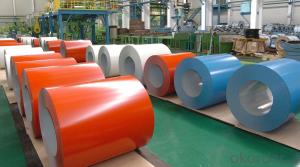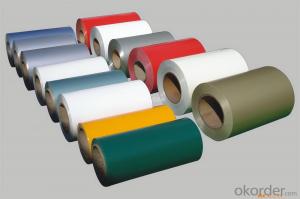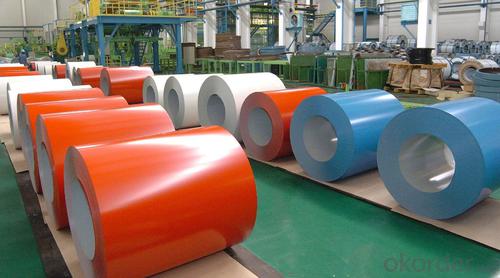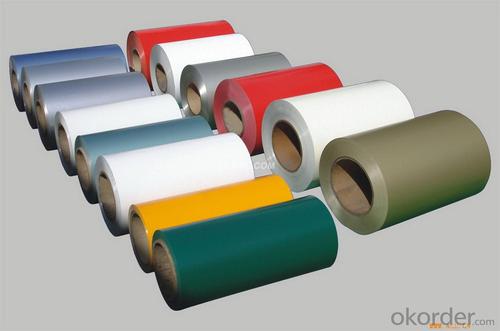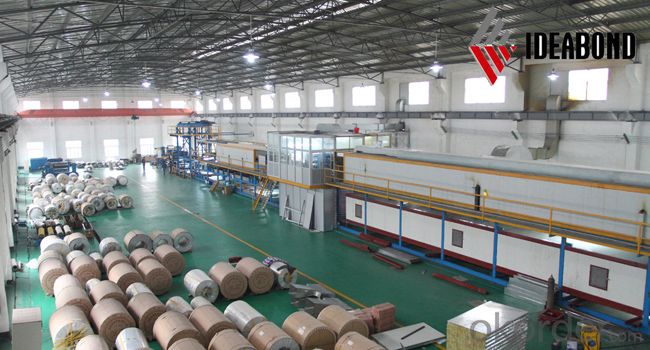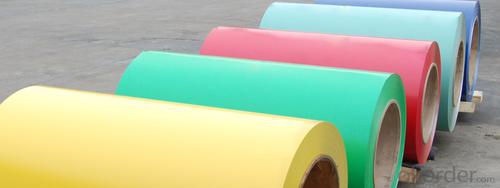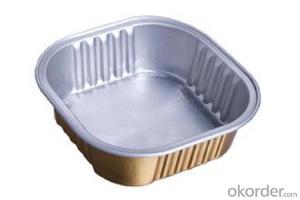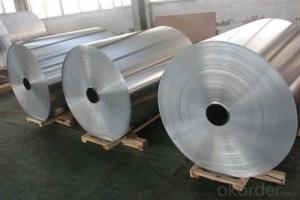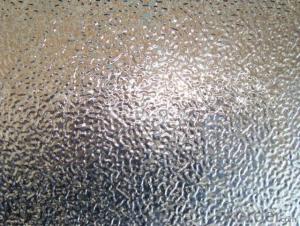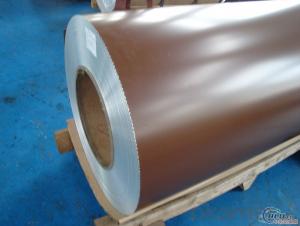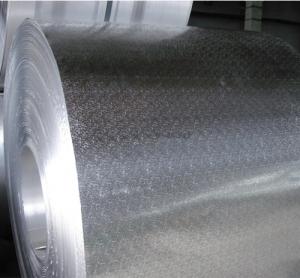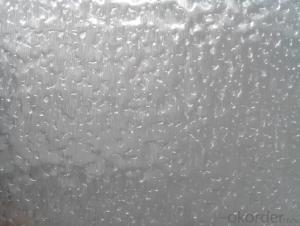Textured Aluminum Coil - PVDF AA1070 Coated Stucco Embossed Aluminum Sheet
- Loading Port:
- Shanghai
- Payment Terms:
- TT OR LC
- Min Order Qty:
- 20 m.t.
- Supply Capability:
- 800000 m.t./month
OKorder Service Pledge
Quality Product, Order Online Tracking, Timely Delivery
OKorder Financial Service
Credit Rating, Credit Services, Credit Purchasing
You Might Also Like
supply Mill-finished / coated aluminum sheet/ coil:
Alloy: AA1050,1060,1100,1200,2024,3003,3304,3005,3015,5052,5086,5754,5083,6061,7050,7475,8011, etc
Temper: O, H14/16/18/22/24/32/ H112/H321/T6,T851,T7451,T7351, etc
Thickness: 0.02mm—20mm
Width: 100mm—2000mm (Can be slitted)
Notice: PE coating / PVDF coating / Embossment can be done if required.
- Q: Can aluminum coils be used in the production of automotive body panels?
- Yes, aluminum coils can be used in the production of automotive body panels. Aluminum is a lightweight and highly malleable material, making it an ideal choice for automotive applications. It offers a good balance between strength and weight, which can help improve fuel efficiency and overall vehicle performance. Additionally, aluminum has excellent corrosion resistance properties, which is crucial for automotive body panels exposed to harsh environmental conditions. The use of aluminum coils in the production of automotive body panels has become increasingly popular as automakers strive to reduce the weight of vehicles and improve their sustainability.
- Q: What are the bending and forming capabilities of aluminum coils?
- Aluminum coils have excellent bending and forming capabilities due to the inherent properties of aluminum as a malleable and ductile material. Aluminum is known for its high strength-to-weight ratio, which allows it to be easily shaped and formed without compromising its structural integrity. When it comes to bending, aluminum coils can be bent into various shapes and angles without fracturing or cracking. The flexibility of aluminum allows it to be formed into tight curves or gentle bends, making it suitable for a wide range of applications. This flexibility is particularly advantageous in industries such as construction, automotive, and aerospace, where curved or complex shapes are often required. In terms of forming, aluminum coils can be easily manipulated into different forms, including flat sheets, tubes, or intricate profiles. This versatility makes aluminum coils highly sought after in industries where customization and design flexibility are important. Furthermore, aluminum coils can undergo various forming processes such as roll forming, stamping, and deep drawing, allowing them to be transformed into different products with precise dimensions and tolerances. These forming capabilities make aluminum coils a preferred choice for manufacturing components, such as automotive body panels, roofing materials, heat exchangers, and structural elements. Overall, the bending and forming capabilities of aluminum coils are exceptional, making them an ideal choice for applications that require flexibility, durability, and design versatility.
- Q: How do aluminum coils compare to brass coils in terms of corrosion resistance?
- Aluminum coils generally offer better corrosion resistance compared to brass coils. This is primarily due to aluminum's natural oxide layer that forms on its surface, providing a protective barrier against corrosion. This oxide layer acts as a shield, preventing moisture and other corrosive elements from reaching the underlying metal. In contrast, brass coils are composed of a combination of copper and zinc, which are more susceptible to oxidation and corrosion. While brass coils may also develop a protective patina over time, it is not as effective as the oxide layer on aluminum coils. Therefore, aluminum coils are often preferred in applications where corrosion resistance is critical, such as in marine or coastal environments.
- Q: What kind of sensor is appropriate for aluminum coil thickness measurement?
- Use two sensors of ZLDS10X series to make a thickness gauge
- Q: How do aluminum coils contribute to sustainable manufacturing practices?
- Aluminum coils contribute to sustainable manufacturing practices by offering several advantages. Firstly, aluminum is a highly recyclable material, which means that using aluminum coils can help reduce the demand for raw materials and minimize waste. Additionally, the lightweight nature of aluminum coils reduces energy consumption during transportation and installation processes. Furthermore, aluminum has excellent corrosion resistance, which extends the lifespan of products made with aluminum coils, reducing the need for frequent replacements. Overall, aluminum coils promote sustainability by conserving resources, reducing energy consumption, and minimizing waste.
- Q: What does 1060 stand for in 1060 aluminum rolling?
- The aluminum has 5052.5005.1006.1060.1070.2024 types which has different compositions. Like iron, different carbon content and different properties of iron.
- Q: The user is asking if it's possible to use an electric welder for joining aluminum coils.
- <p>Yes, you can use an electric welder to weld aluminum coils together. However, it's important to use the correct type of welder and settings. Gas tungsten arc welding (GTAW), also known as TIG welding, is commonly used for aluminum due to its precision and ability to control heat input. MIG (Metal Inert Gas) welding can also be used for thicker aluminum materials. Ensure you use the right filler material, a suitable welding current, and proper shielding gas to prevent oxidation. Always follow safety precautions and consult with a professional if you're unsure about the welding process.</p>
- Q: How does the gauge of aluminum coils affect their performance?
- The thickness of the aluminum sheet used to make the coil determines the gauge of aluminum coils. The gauge is typically measured by its thickness, with a smaller gauge indicating a thicker sheet. The performance of aluminum coils is significantly influenced by their gauge. To begin with, the strength and durability of the aluminum coil are affected by the gauge. Thicker gauges offer greater strength and resistance to bending or warping, making them suitable for applications that require sturdy and long-lasting coils. Conversely, thinner gauges are more flexible but may be prone to damage or deformation, making them suitable for less demanding applications. Furthermore, the gauge affects the thermal conductivity of the aluminum coil. Thicker gauges have lower thermal conductivity, resulting in slower heating or cooling. This characteristic can be advantageous in applications where precise temperature control is crucial, as it helps maintain a stable environment. On the other hand, thinner gauges have higher thermal conductivity, enabling faster heat transfer. This can be beneficial in applications that require rapid heating or cooling. Moreover, the gauge affects the weight and cost of the aluminum coil. Thicker gauges are heavier and generally more expensive due to the increased amount of material required. This factor is important to consider in applications where weight or cost plays a significant role. Thinner gauges, being lighter and less expensive, are more suitable for applications that prioritize weight reduction or cost efficiency. Lastly, the gauge influences the ease of fabrication and formability of the aluminum coil. Thinner gauges are more easily bent, shaped, or formed into desired configurations, making them suitable for applications that involve intricate or complex designs. Although thicker gauges are less malleable, they can still be formed with specialized equipment or processes. In conclusion, the gauge of aluminum coils directly affects their performance. It influences their strength, durability, thermal conductivity, weight, cost, and formability. Therefore, selecting the appropriate gauge for a specific application is crucial to ensure optimal performance and efficiency.
- Q: 1) Do you recycle aluminum (soda cans, etc.)?2) Why do or don't you recycle aluminum?3) Does it make a difference to the economy whether we recycle or not?4) Does it make a difference to the environment whether we recycle or not?5) What do you think would help people to recycle more? Such as a reward, information, resources, etc. Don't feel the need to limit responses. Thank you.
- 1) I do recycle aluminum when I have it. 2) Well I don't really recycle it because I don't drink soda or beer or use much foil. It's actually bad for you all together so I avoid it. When I do recycle aluminum I do it we're taught that its supposed to be recycled. I more commonly recycle paper and plastic. 3) Of course it makes a difference whether we recycle. It allows for re use of most material in essence slows down the proportion of useless garbage. 4) Yes it does, in my opinion. 5) I think that being taught and explained thoroughly at a young age would help. Not only teaching but setting n example. Also, supplying readily available recycle bins at schools, shopping centers, public and at home should enforce it more.
- Q: This question asks for methods to prevent corrosion on aluminum coils during storage or transportation.
- <p>To prevent corrosion on aluminum coils during storage or transportation, follow these steps: 1. Store the coils in a dry, clean environment to avoid moisture and dirt. 2. Use protective wrapping or covers to shield the coils from moisture and contaminants. 3. Ensure proper ventilation in storage areas to prevent condensation. 4. Avoid stacking coils directly on the ground; use pallets or racks to keep them off damp surfaces. 5. Handle the coils carefully to prevent scratches or damage that could lead to corrosion. 6. Regularly inspect the coils for signs of corrosion and address any issues promptly. 7. Consider using anti-corrosion coatings or treatments on the coils if they will be stored for extended periods. By following these guidelines, you can minimize the risk of corrosion and maintain the integrity of your aluminum coils.</p>
Send your message to us
Textured Aluminum Coil - PVDF AA1070 Coated Stucco Embossed Aluminum Sheet
- Loading Port:
- Shanghai
- Payment Terms:
- TT OR LC
- Min Order Qty:
- 20 m.t.
- Supply Capability:
- 800000 m.t./month
OKorder Service Pledge
Quality Product, Order Online Tracking, Timely Delivery
OKorder Financial Service
Credit Rating, Credit Services, Credit Purchasing
Similar products
Hot products
Hot Searches
Related keywords
